Iran’s FM Invites UAE President To Tehran
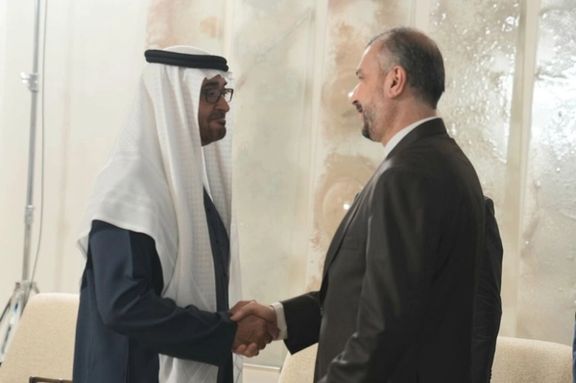
The Iranian foreign minister has invited Sheikh Mohamed bin Zayed, the president of the United Arab Emirates, to Tehran.

The Iranian foreign minister has invited Sheikh Mohamed bin Zayed, the president of the United Arab Emirates, to Tehran.
Hossein Amir-Abdollahian presented bin Zayed with the invitation on behalf of Iranian President Ebrahim Raisi on Thursday.
The Iranian top diplomat arrived in Abu Dhabi on the fourth and final leg of his regional tour.
Among the topics discussed were consular, cultural, economic, and political relations between Iran and the UAE.
Amir-Abdollahian visited Qatar, Oman, and Kuwait before traveling to the UAE.
Meanwhile, his deputy for political issues met with Legal Advisor to Qatari Foreign Minister, Mohammad AlKhulaifi in Doha Wednesday night.
Ali Bagheri-Kani called lasting peace and stability dependent on development and progress in the countries of the region.
“The peace and stability that does not lead to development and progress is temporary, unstable,” he noted.
Referring to the progressing relations between the two countries, AlKhulaifi said “Iran and Qatar are always partners in bringing peace and stability to the region.”
Recent restoration of diplomatic ties between Saudi Arabia and Iran signaled a new policy by the Persian Gulf Sunni Arab states for closer regional ties.
A deal brokered by China in March ended a diplomatic rift between Iran and Saudi Arabia, and re-established relations following years of hostility.
In 2016, protesters attacked the Saudi embassy in Tehran in retaliation for Riyadh's execution of a prominent Shiite cleric, which led to Riyadh severing its ties with Tehran.
The UAE and Bahrain quickly followed Saudi Arabia in severing diplomatic relations with Iran.
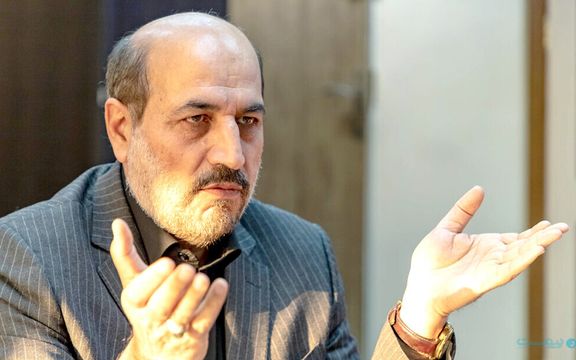
A member of the Iranian parliament criticized the high price of Chinese cars in the country saying Iranians pay 10 times more than its value.
Lotfollah Siahkali said: “The real price of a Chinese car is 6,000 dollars, but we sell for 60,000. Which governance rule does this follow? People are aware of the difference in car prices inside Iran and abroad. Why are we like this?"
This is not the first time the issue of importing cars or car parts from China has drawn criticism.
Last year, Mehdi Dadfar, the Secretary of the Car Importers Association, criticized the ban on car imports and market saturation by Chinese cars and parts.
“They did their best to prevent the import of famous brands and turned the country into one of the provinces of China,” he said.
It seems that China does not want to manufacture cars in Iran and prefers to export cars or parts.
For years critics and politicians have criticized the government-controlled auto industry and have referred to a “mafia” running the money-losing and inefficient sector.
Iran’s two main carmakers – Saipa and Iran Khodro – can only produce 1,400,000 units of light and heavy vehicles, mostly sub-standard older foreign models.
China has been the world’s largest car maker since 2008, with its output since 2009 higher than the US, European Union, and Japan combined. But the quality of Chinese cars is considered poor, with focus on low prices and high production numbers.

As more signs show renewed contacts between Iran and the West, a bipartisan group of 26 US senators have asked President Joe Biden not to rush into a bad agreement.
The senators expressed their concern over reports that the administration is trying to reach a limited nuclear deal with Iran, which it apparently intends to keep out of the US Congress by not signing a formal document.
“It is crucial for your administration to remain aligned with Congressional efforts related to Iran’s nuclear program and not agree to a pact that fails to achieve our nation’s critical interests,” the letter said.
The Jewish Insider reported that the bipartisan coalition was formed and the text drafted before recent revelations of talks with Iran, but it now has assumed new significance.
The letter was led by Sens. Kirsten Gillibrand (D-NY) and James Lankford (R-OK), but there are several Democratic senators who previously supported the 2015 JCPOA nuclear deal.
While the Biden administration has not denied regular direct and indirect contacts with Iran, diplomatic activities picked up speed this week as Iran’s foreign minister Hossein Amir-Abdollahian visited Qatar and Oman, traditional mediators between Washington and Tehran. Iran’s chief nuclear negotiator Ali Bagheri-Kani also met with the European Union’s negotiator Enrique Mora in Qatar.
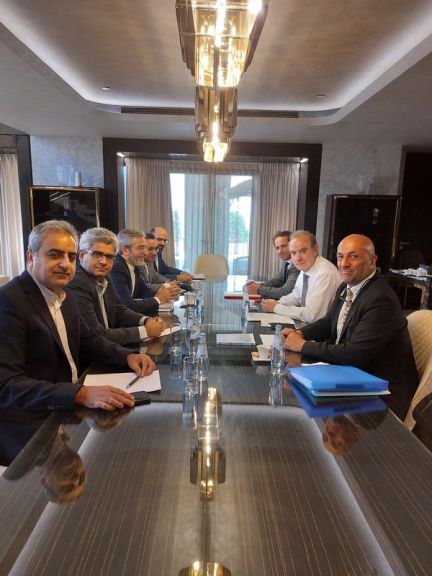
“We exchanged views and discussed a range of issues including negotiations on sanctions lifting,” Bagheri-Kani tweeted after the meeting. The Iranian régime calls the negotiations talks to lift sanctions, not to a nuclear deal.
“It is imperative today that we strengthen our efforts to deter Iran from achieving nuclear weapons capability. We must make Iran understand, in no uncertain terms, that further advances in its nuclear program will be met with unified international action,” the 26 senators wrote to Biden.
US lawmakers have repeatedly complained about the Biden administration’s lax sanctions enforcement against Iran, especially with China steadily increasing imports of embargoed Iranian oil.
Since Biden’s election in 2020, Iran’s daily oil exports have jumped from 250,000 barrels per day to nearly 1.5 million, mostly going to China through illicit methods.
“Iran simply cannot be allowed to advance its nuclear program with impunity and the PRC cannot be given a pass for accelerating Iran’s destabilizing behavior. We urge you to restore this posture of deterrence and provide leadership to strengthen the resolve of the international community,” the letter said.
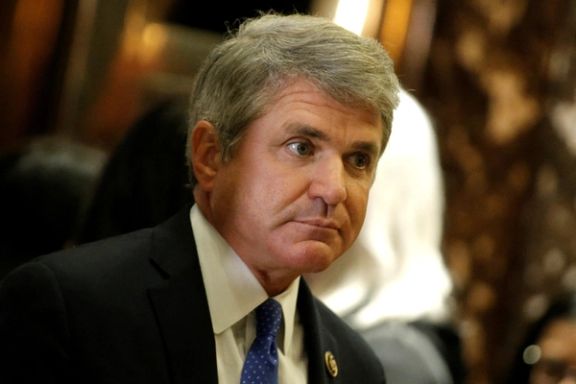
Last week House Foreign Affairs Committee Chairman Rep. Michael McCaul also sent a letter to President Joe Biden saying, “I am disturbed by recent revelations that the Administration has re-engaged in ‘proximity talks’ with the Iranian regime, and that the results of these discussions have included the apparent greenlighting of sizable payments to Iran.“
He was referring to the White House allowing Iraq to release more the $2.7 billion in Iran’s frozen funds earlier this month.
McCaul urged Biden to respect the Iran Nuclear Agreement Review Act of 2015 (INARA), which was enacted during the finalization of the Joint Comprehensive Plan of Action (JCPOA) in 2015 to allow Congress to oversee dealings with Tehran. The Obama administration decided not to make the JCPOA nuclear deal a treaty, given opposition in Congress at the time and agreed to INARA to neutralize opposition among lawmakers.
„We urge you to take meaningful steps to curb Iran’s destabilizing activities and deter the regime from pursuing this nefarious ambition any further,“ the senators told President Biden.

As women en-masse defy the mandatory hijab in Iran, an Iranian member of parliament urged for modesty rules for men as well.
Alireza Pak-Fetrat said on Wednesday that men with tattoos must keep them covered, so as not to break Islamic law, which forbids tattoos as an unholy and unnecessary body ornament, defacing the sacred physical body.
He also stressed that men must ensure their clothing appropriately covers their bodies, such as when riding bikes or sitting in public places, so as not to tempt women by revealing bare skin.
Heated debates over a new bill about how to deal with women who refuse to observe compulsory hijab continues inside and outside the Iranian parliament. The bill mainly relies on cash fines to force women to wear the hijab.
The uprising that was sparked by the death in police custody of Amini has made it increasingly difficult for the clerical regime to enforce the mandatory Islamic dress code. Since the beginning of the ‘Women, Life, Liberty’ movement in September last year, thousands of girls and women have set fire to their headscarves in a symbolic move and voiced opposition to compulsory hijab.
To avoid the public backlash over the violent enforcement of hijab laws, the Islamic Republic has recently begun implementing a wide range of measures from public humiliation tactics -- such as preventing women without hijab to enter subway stations and public places -- to using traffic cameras to identify women without hijab.
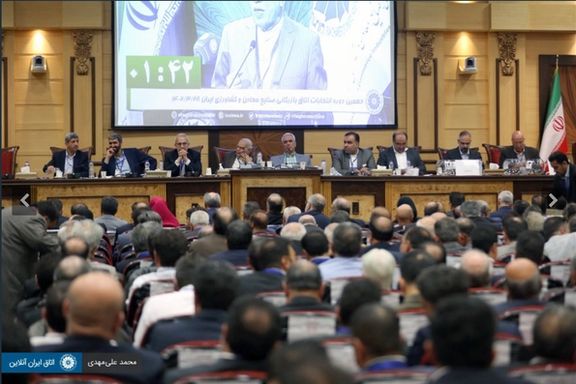
Around 30 lawmakers have urged the government to recent annual elections at the Iran Chamber of Commerce, which sometimes voices independent opinions.
In a letter to the newly appointed minister of industry, mines and trade, Abbas Aliabadi, published by the hardliner Tasnim news website, these lawmakers said the position of the chairman of the chamber, which represents the private sector, is considered as a “significant and sensitive position according to law”.
In elections held Sunday, Hossein Salahvarzi, a businessman who has been an outspoken critic of the government, was elected as chairman.
One of the two candidates who ran against Salahvarzi, Younes Zhaeleh, is known to have close ties with the government.
Salahvarzi obtained 265 votes against 95 votes for Zhaeleh and 62 votes for Hossein Pir-Moazzen.
The chairman of the chamber which has over 400 members has the role of coordinating between the private sector and the government and is sometimes required to participate in meetings with government officials.
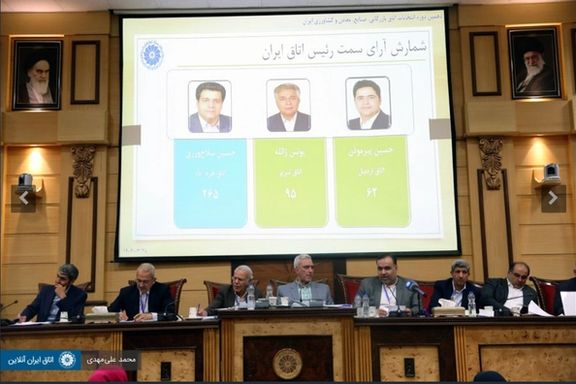
Therefore, the lawmakers argued, the newly elected chairman who they claimed had supported the recent protests and those who sought to overthrow the Islamic Republic, should not have been allowed to run.
The chamber of commerce is a semi-independent organization, which like media outlets is monitored and controlled by the regime. An outright opponent would not be allowed to run for its chairmanship.
“Did the country’s security and supervisory bodies take national interests as a joke” they asked and said Salahvarzi had not been approved to run by the ministry’s security department.
Tasnim also claimed that “security and supervisory bodies”, presumably the ministry of intelligence and IRGC’s intelligence organization (SAS), have referred to “financial [corruption] cases” for Salahvarzi’s disqualification in their correspondences.
Donya-ye Eghtesad, an economic daily, reported that until Saturday evening it was still unclear whether the chamber’s elections would be held according to schedule the next day due to the controversies over the vetting of candidates including Salahvarzi.
Iran Chamber of Commerce often referred to as “private sector’s parliament” has around four hundred representatives who are annually elected at the provincial level.
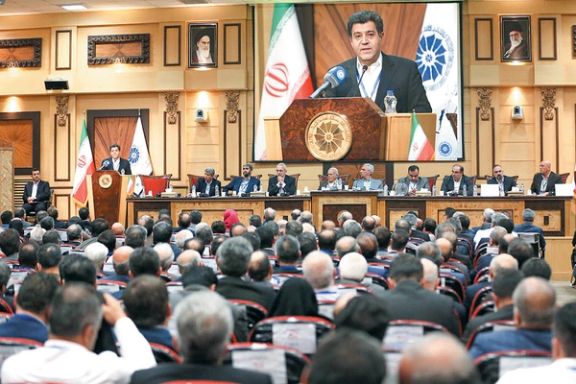
The last elections of chambers of provinces were held on March 11 instead of February 29 because a supervisory body disqualified over 40 percent of candidates, delaying the vetting process.
Mehdi Karbasian, a former deputy minister of industry who represents several high-profile companies, and Masoud Khansari, the then incumbent chairman of Tehran Chamber of Commerce, the most influential chamber in the country, were among the disqualified candidates.
Khansari and other members of the chamber had criticized regime policies that have led to an economic crisis, including a confrontational foreign policy.
Authorities said the vetting was based on a recent regulation that required candidates to have at least two consecutive years of membership in chambers of commerce, to have paid insurance for a minimum of twenty employees during the past year, to have had a minimum annual turnover of 150 billion rials, and to have also been awarded for exports by the Trade Development Organization.
However, some Iranian media outlets such as Aftab News which is close to former President Hassan Rouhani and the Moderation and Development Party alleged that the real reason behind the disqualifications was political as these candidates had been speaking against the government of President Ebrahim Raisi and its policies.
“The ministry of industries, mines and trade and the government are trying hard to shift the control of the chambers, particularly the chambers of Iran and Tehran, to a certain political faction,” Aftab News quoted one of the disqualified candidates who did not want to be named as saying.
Another daily, the reformist Etemad newspaper, predicted that the elections would be engineered to shift the control to government supporters.
Chambers of commerce often produce economic reports that the government finds embarrassing, or they criticize proposed budget bills and other plans.
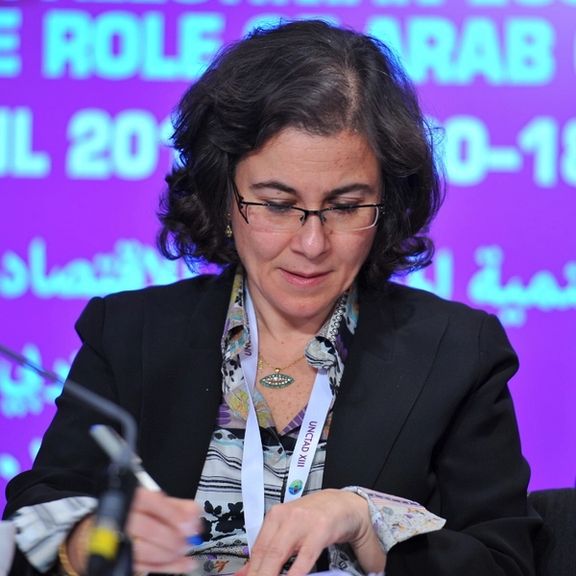
The United Nations has again warned that the human rights situation in Iran has “markedly deteriorated”.
Nada Al-Nashif, UN Deputy Human Rights Chief, presented a report to the Human Rights Council in Geneva on Wednesday saying that the situation in the Islamic Republic aggravated against the backdrop of continuously worsening socio-economic conditions and sanctions.
The report examines developments since the death of 22-year-old Mahsa Amini on September 16which sparked widespread protests throughout the country.
According to the report, there has been a spike in death sentences and executions during the period.
“In 2022, 582 people were executed”, noted the Deputy High Commissioner of UN human rights office OHCHR.
“That is a 75 per cent increase compared to 2021 during which 333 people were reportedly executed. There were three children among those executed in 2022. Of the total number of executions, 256 were for drug-related offences.”
This year alone, that number is already in the hundreds. However, while the UN voices concern for human rights in Iran, it has appointed Iran's UN ambassador Ali Bahraini to the chair of the UN Human Rights Council 2023 Social Forum, drawing global outrage.
Around 20,000 people are estimated to have been detained during the protests, added the report.
“Thousands of children are estimated to have been among those arrested during the protests, while at least 44 children, including 10 girls, were reportedly killed by security forces using lethal force.”
“There have been numerous allegations of torture and ill-treatment of individuals by security forces during arrest and interrogation to extract forced confessions as well as allegations of sexual and gender-based violence committed against women, men and children, especially in detention,” said Al-Nashif.
She also noted that as of March 2, more than 1,000 students, the majority of whom are female, had reportedly been affected by suspected poisoning across 91 schools in 20 provinces.